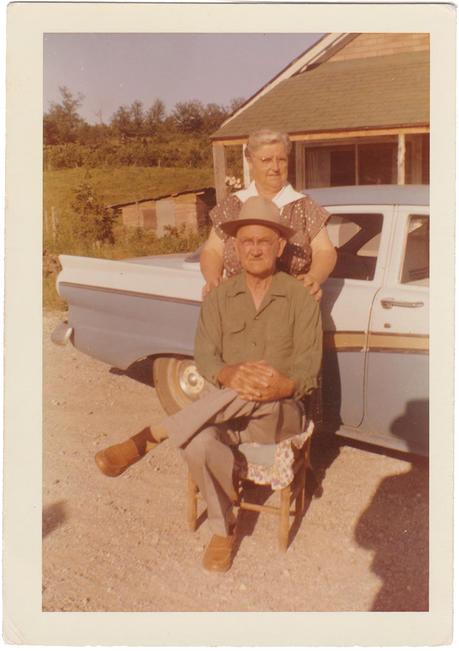As an English teacher and writer, my mother has been a huge influence on my own love of words. She and I have also enjoyed a lifetime of spirited political discussions. We’re not always 100% on the same side, yet there’s always a willingness to listen and an attempt to understand one another.
One of the first things I remember reading of my mother’s was a story about my great-grandfather (her maternal grandfather). While she describes him as a staunch Republican, both the GOP and Democratic party have evolved considerably since the 1960s and 70s. The takeaway is the importance he placed on voting, another value I proudly inherited from my mother… who obviously had a strong influence of her own.

My great-grandparents, Lewis & Elizabeth Keylon. Union, AR, circa 1960. Photo courtesy of Beverly Almond
A Legacy of Voting
By Beverly Almond
He was a barber in Oklahoma, an asylum attendant in Kansas, a machinist, a violin maker and a grocer in Arkansas. He was a veteran of WWI, “sort of” a Methodist, and always a Republican! Grandpa probably didn’t use the term “Renaissance Man,” yet he was one. A “jack-of-all-trades” was his self-label. As a youth, he was champion of the spelling bees in his county. In old age, he was champion of the rights of the elderly. He received a citation for his exposure of careless medication practices in nursing homes, such as the one he lived in the last eleven years of his life. Whether he was carving a violin from the aged wood remaining from an attic trunk his mother moved West in or was repairing a battered old sewing machine, he performed his varied jobs with skill and pride.
Since Grandpa married and had a family later than most men of his generation, he was already elderly when I, the first grandchild, came along. Most of his adventures were merely memories by the time I knew him. However, there was enough spunk left in him to be a source of delight and challenge to me.
Books, newspapers, the radio, and The Congressional Record were Grandpa’s constant companions. He and my grandmother were the best informed people in the community, so people from miles around would gather on their front porch or in their sitting room to discuss the latest issues and be updated on current events. Grandpa thrived on the whirl of world events and the ups and downs of national politics. Although he was a man of very modest means and never able to see much of the world, his mind traveled far.
That keen mind carried Lewis Emmett Keylon ahead of his time and beyond his place. While he was from a large family and most of his contemporaries had large families, he was an advocate of Zero Population Growth before it became a sociological buzzword in population control and family planning. In his early eighties, he boasted to me, “Did you realize Lizzy and I had only two children; they each had two children; and each grandchild has only two children? Not a bad record for an over-populated world!” He never lived to see me, the oldest grandchild, break with tradition. But in spite of his progressive position on ZPG, he would have accepted another great grandchild—I never lacked his approval. As far back as I can remember, he would always say, “Leave her alone; she knows what she’s doing.”
A Man Ahead of His Time
If Grandpa was ahead of his generation socially, he was even farther ahead of his neighbors politically. During the 1950s in Arkansas, both the “silent majority” and the voiced majority were Old South Democrats, marching to the drum-beat of the infamous Orval Faubus. By contrast, Grandpa was an “Ike Man” all the way. An autographed photograph of President Eisenhower hung on Grandpa’s bedroom wall. “Look at Ike,” he would say fondly, as if speaking of a personal friend. “He is looking directly at you, regardless of which side of the room you are on.” And Ike was! That was a mystery I could never figure out.
Even during the confrontation between President Eisenhower and Governor Faubus over the desegregation of Central High School, Grandpa’s loyalty to the President remained firm. “Faubus and the newsmen are making jackasses of every last one of us!” he would grumble.
Although Grandpa’s political influence in the community was minimal, some of the local politicians employed a few, basically harmless, tactics to mute his “radical influence.” Due to his heart condition, on one occasion he was unable to climb the stairs to the polling booth. The election officials refused to provide a ballot for him downstairs. Over the years, however, as his North Arkansas community grew with “outsiders from the North,” Grandpa gained political comrades.
A Persistence for Democracy
One of Grandpa’s more influential political friends was his doctor. In fact, Dr. Duccer made it possible for Gramps to exercise his rights and responsibilities as a loyal Republican and proud American. Late in October of 1976, Grandpa became seriously ill and was admitted to the hospital. However, a week later, he rallied and was able to sit in bed, talk and eat. Election Day was nearing, but he knew he wouldn’t be dismissed from the hospital in time to vote in the November election. The day before the election, Grandpa was wishing aloud to Dr. D. “This is the first election I’ve missed in many years.”
“You really want to cast that vote don’t you, Mr. Keylon?” the doctor queried sympathetically.
“Ya dang right I do!” was the response from his aged, worn body but from a clear, quick mind—a mind as quick and clear as it had been in the days of the spelling bee.
“I’ll see what I can do,” promised Dr. Duccer.
Early on election morning, November 1976, the county clerk came to Grandpa’s hospital room with a ballot that was to be the first ever cast from a bed in the local hospital. It was never a secret whom Grandpa would vote for, so he didn’t mind that the clerk was hand-carrying his vote back to the polling center. Somehow all of those years of hassle from the local politicians no longer bothered him either. He was confident that his vote would count this time. Times had changed!
Of course, Grandpa’s vote was not quite enough to put his man Jerry Ford back in the White House. But Grandpa lived the remaining months of his life with the satisfaction that he had once again participated in one of the most prized actions of a democratic society. He recognized the right and responsibility to vote as being essential to the system he defended—for Democrats too—most of his 88 years.
. . . . . . . . . . . . . . . . . . . . . . . . . . . . . . . . . . . . . . . . . . . . . . .
Never miss a post! Subscribe to Designer Daddy by entering your email below SUBSCRIBE at the top of this page, or clicking here.


